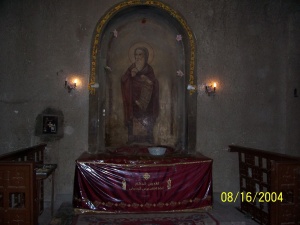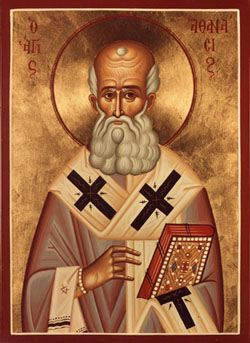Atanasie al Alexandriei: Diferență între versiuni
(propunere de traducere de pe orthodoxWiki.org) |
Magda (Discuție | contribuții) m (successiune, en, cat) |
||
| Linia 1: | Linia 1: | ||
{{Traducere EN}} | {{Traducere EN}} | ||
| − | [[Image:Athanasius.jpg|right|frame| | + | [[Image:Athanasius.jpg|right|frame|Sf. Atanasie]] |
| − | Our father among the saints ''' | + | Our father among the saints '''Atanasie al Alexandriei''' (from Greek, "immortal") was a bishop of Alexandria and major theological writer in the fourth century. He is also called '''Athanasius the Great''' and (by the [[Church of Alexandria (Coptic)|Coptic church]]) '''Athanasius the Apostolic'''. He was born in 298 and died on [[May 2]], 373. His [[feast day]] in the [[Orthodox Church]] is [[January 18]]. |
| − | == | + | ==Viaţa== |
He was born to pagan parents. When he was in school he saw a group of Christians acting out services and when he asked to join them, they refused. From then on he declared himself Christian. The patriarch at that time, Pope [[Alexander of Alexandria|Alexander]], predicted that he would eventually hold a great position. | He was born to pagan parents. When he was in school he saw a group of Christians acting out services and when he asked to join them, they refused. From then on he declared himself Christian. The patriarch at that time, Pope [[Alexander of Alexandria|Alexander]], predicted that he would eventually hold a great position. | ||
| Linia 28: | Linia 28: | ||
{{start box}} | {{start box}} | ||
| − | {{ | + | {{succesiune| |
| − | + | înainte=Alexandru| | |
| − | + | titlu=[[Listă a patriarhilor de Alexandria|Patriarh de Alexandria]]| | |
| − | + | ani=326-373| | |
| − | + | după=Petru II|}} | |
{{end box}} | {{end box}} | ||
| Linia 38: | Linia 38: | ||
<references /> | <references /> | ||
| − | == | + | ==Legături externe== |
*[http://www.ccel.org/fathers2/NPNF2-04/TOC.htm Background information and writings] | *[http://www.ccel.org/fathers2/NPNF2-04/TOC.htm Background information and writings] | ||
*[http://ocafs.oca.org/FeastSaintsViewer.asp?FSID=100219 St Athanasius the Great the Archbishop of Alexandria] ([[OCA]]) | *[http://ocafs.oca.org/FeastSaintsViewer.asp?FSID=100219 St Athanasius the Great the Archbishop of Alexandria] ([[OCA]]) | ||
| Linia 46: | Linia 46: | ||
*[http://www.comeandseeicons.com/a/pha14.htm St. Athanasios the Great Icon and Story] | *[http://www.comeandseeicons.com/a/pha14.htm St. Athanasios the Great Icon and Story] | ||
| − | [[ | + | [[Categorie:Episcopi]] |
| − | [[ | + | [[Categorie:Sfinţi Părinţi]] |
| − | [[ | + | [[Categorie:Patriarhi de Alexandria]] |
| − | [[ | + | [[Categorie:Sfinţi]] |
[[ar:أثناسيوس السكندري]] | [[ar:أثناسيوس السكندري]] | ||
| + | [[en:Athanasius of Alexandria]] | ||
Versiunea de la data 16 februarie 2008 04:54
| Acest articol (sau părți din el) este propus spre traducere din limba engleză!
Dacă doriți să vă asumați acestă traducere (parțial sau integral), anunțați acest lucru pe pagina de discuții a articolului. |
Our father among the saints Atanasie al Alexandriei (from Greek, "immortal") was a bishop of Alexandria and major theological writer in the fourth century. He is also called Athanasius the Great and (by the Coptic church) Athanasius the Apostolic. He was born in 298 and died on May 2, 373. His feast day in the Orthodox Church is January 18.
Viaţa
He was born to pagan parents. When he was in school he saw a group of Christians acting out services and when he asked to join them, they refused. From then on he declared himself Christian. The patriarch at that time, Pope Alexander, predicted that he would eventually hold a great position.
Before reaching the age of 20, Athanasius wrote a treatise entitled On the Incarnation, affirming and explaining that Jesus Christ was both God and Man. In about 319, when Athanasius was a deacon, a presbyter named Arius began teaching that there was a time before God the Father begat Jesus when the latter did not exist. Athanasius responded that the Father's begetting of the Son, or uttering of the Word, was an eternal relationship between them, not an event that took place within time. Thus began catholic Christianity's fight against the heresy of Arianism.
Athanasius fought consistently against Arianism all his life. As a deacon, he accompanied Alexander of Alexandria to the First Council of Nicea in 325, which produced the Nicene Creed and anathematized Arius and his followers. The Coptic church maintains a tradition that Athanasius was the main author of the Nicene Creed, and has therefore given him the title of Defender of the Faith.
On May 9, 328, he succeeded Alexander as bishop of Alexandria, becoming the 20th Patriarch of the Church of Alexandria, a position which he held for 45 years, 16 of which he spent in exile. As a result of rises and falls in Arianism's influence, he was banished from Alexandria only to be later restored on at least five separate occasions, perhaps as many as seven. This gave rise to the expression Athanasius contra mundum or "Athanasius against the world." During some of his exiles, he spent time with the Desert Fathers, monks and hermits who lived in remote areas of Egypt.
Athanasius is also the first person to identify the same 27 books of the New Testament that are in use today; up until his Easter letter, various similar lists were in use. However, his list was the one that was eventually ratified by a series of synods and came to be universally recognized as the New Testament canon.
He also wrote a biography of Anthony the Great that later served as an inspiration to Christian monastics in both the East and the West. The Athanasian Creed is traditionally ascribed to him, though it is likely not his work.

The following is a troparion (hymn) to St. Athanasius sung in some Orthodox churches:
- O holy father Athanasius,
- like a pillar of orthodoxy
- you refuted the heretical nonsense of Arius
- by insisting that the Father and the Son are equal in essence.
- O venerable father, beg Christ our God to save our souls.
| Atanasie al Alexandriei | ||
|---|---|---|
| Precedat de: Alexandru |
Patriarh de Alexandria 326-373 |
Urmat de: Petru II |
Reference
Legături externe
- Background information and writings
- St Athanasius the Great the Archbishop of Alexandria (OCA)
- Athanasios & Cyril, Patriarchs of Alexandria (GOARCH)
- Saint Athanasius the Great, Archbishop of Alexandria (Prologue of Ohrid)
- The Departure of St. Athanasius the Apostolic the 20th. Pope of Alexandria (Coptic)
- St. Athanasios the Great Icon and Story
Categorii > Istoria Bisericii
Categorii > Liturgică > Sărbători > Sfinți
Categorii > Liturgică > Sărbători > Sfinți > Sfinți Părinți
Categorii > Locuri > Ortodoxia pe țări > Ortodoxia în Africa > Patriarhi ai Alexandriei
Categorii > Oameni
Categorii > Oameni
Categorii > Oameni > Cler
Categorii > Oameni > Cler
Categorii > Oameni > Cler
Categorii > Oameni > Episcopi
Categorii > Oameni > Episcopi
Categorii > Oameni > Episcopi > Episcopi după localitate
Categorii > Teologie > Eclesiologie > Jurisdicții
